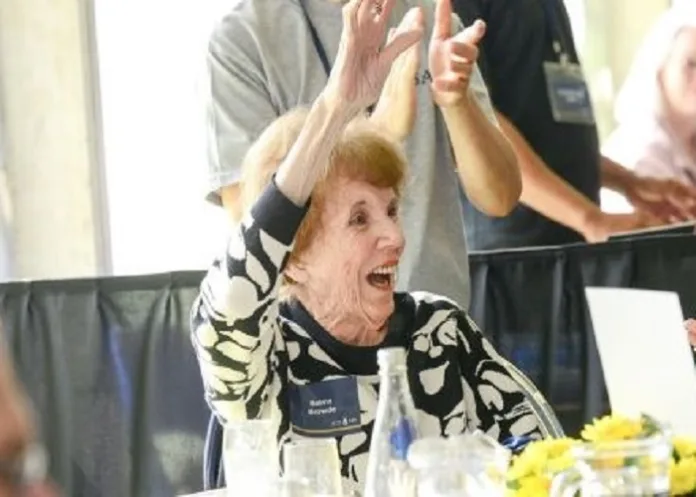Selma Browde, doctor, politician and health activist, died in her Johannesburg home on 26 December 2023. Writing in Daily Maverick, Max Price pays tribute to her compassion, passion and advocacy on behalf of disadvantaged communities in South Africa which spanned more than six decades.
Born in 1926 in Cape Town to a middle-class Jewish family with roots in Lithuania and Ukraine, Browde studied medicine in Cape Town and Johannesburg.
She interrupted her medical studies to marry and have three children, graduating from Wits in 1959. She received her specialist degree in Radiation Oncology in 1967 and was then appointed as a senior consultant and lecturer in that department.
In 1972, at the urging of Progressive Party MP Helen Suzman, Browde stood for election to the Johannesburg City Council on a Progressive Party (PP) platform, despite not being a member of that party.
She had been a member of the Liberal Party. Both the Progressive and Liberal parties had had some black members. (After the government passed legislation forbidding mixed-race membership of political parties, the smaller Liberal party decided to disband in 1968 rather than be all white, whereas the PP chose to continue as an all-white party, believing that some opposition to apartheid was needed in Parliament.)
Browde was convinced that as a non-member she stood no chance of winning; yet to her surprise, of 14 PP candidates on the roll, she was the only one to win election to the council.
She soon came to be seen as the unofficial council representative of the black, Indian and coloured communities around Johannesburg.
Browde retained her post in the Radiation Oncology department and pursued her council work from a home office, to which as many as 20 people from various “townships” came daily seeking help or advice.
In 1974, she was elected to the Transvaal Provincial Council and pursued her activism beyond the confines of the city and provincial councils.
She also joined human rights lawyer Shun Chetty to start Action to Stop Removals (ActStop) in 1976, to fight forced removals conducted under the Group Areas Act; and, with Dr Nthatho Motlana, launched the Hunger Concern Programme, which subsequently became “Operation Hunger.”
Other community organisations to which she lent her support and fund-raising energies included the Mobile Recreation Scheme for Soweto, the SA Association of Youth Clubs, the Senior Citizens Foundation, the Federated Union of Black Artists, the Johannesburg Art Foundation, and the National Education Union of SA.
In 1978, Browde resigned her position on the provincial council after her inquiries into corruption allegations were repeatedly obstructed.
She returned to her post in the Radiation Oncology department, and in the early 1980s was appointed professor and HoD at the Johannesburg General Hospital.
Browde retired from her post for health reasons in 1986.
She was on the committees or boards of the National Cancer Association (Southern Transvaal), Hospice, the Family Life and Marriage Society of SA, the Medical Association of SA, the Colleges of Medicine of SA Faculty of Radiology, and in the 1980s, was involved in the anti-apartheid, UDF-aligned National Medical and Dental Association (Namda).
Through Namda, she became involved in examining and treating people after their release from security detention and participated in research publicising the physical and psychological torture and duress to which detainees were subjected.
After her retirement, Browde became involved in palliative medicine with a focus on pain management at all stages of diseases. Her advocacy resulted in the formation of a committee to formulate a Palliative Medicine policy within the Gauteng Health Department, although she remained frustrated by the lack of active implementation after the committee gave its report.
In 1998, she founded the Palliative Medicine Institute (PMI) at Chris Hani Baragwanath Hospital (CHB). Although she had retired 10 years before I became dean at Wits, she was so driven by her conviction that doctors were ignorant of how to manage patients’ pain that she would demand regular meetings with me and the heads of medical departments to insist on curricular changes.
She also persuaded the heads at Johannesburg and CHB hospitals to set up palliative care teams and personally trained numerous nurses in this area.
On discovering her son had HIV, Browde focused her attention increasingly on the epidemics of HIV/Aids and TB in South Africa.
In 2000, she founded the NGO Parents for Aids Action. Starting in Alexandra Township, the goal was to educate families about HIV/Aids and so break the stigma attached to the virus.
The organisation developed the ‘Community Action Street-based Primary Health Model’ engaging residents in their homes on how to prevent the spread of these epidemics. She was also a committee member of numerous other Aids-related organisations.
In 2004, she was awarded an Honorary Doctorate of Science by Wits University.
For me, personally, one of the greatest inspirations I draw from Selma’s life was how she refused to give up on the causes in which she believed.
Yes, she was frequently furious and frustrated with the bureaucracies with which she butted heads; she continued to hammer away at those who would not agree with her vision – whether this was a particular definition of palliative medicine or a model of primary community care; but she did not give up.
She was an active participant and contributor to a progressive health WhatsApp group, even in her 98th year – voicing outrage, demanding answers, urging action, attending events.
She will remain an example to struggle veterans not to become jaded or give up the fight, because the marginalised and sick need our support more than ever.
Selma Browde is survived by three sons, seven grandchildren and five great-grandchildren.
Daily Maverick article – Selma Browde’s death leaves South Africa a little poorer (Open access)
See more from MedicalBrief archives:
SAHPRA’s Helen Rees: an appetite for justice

